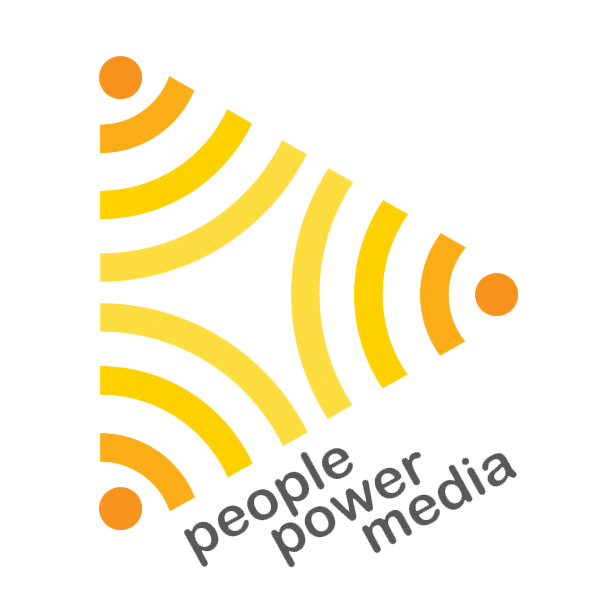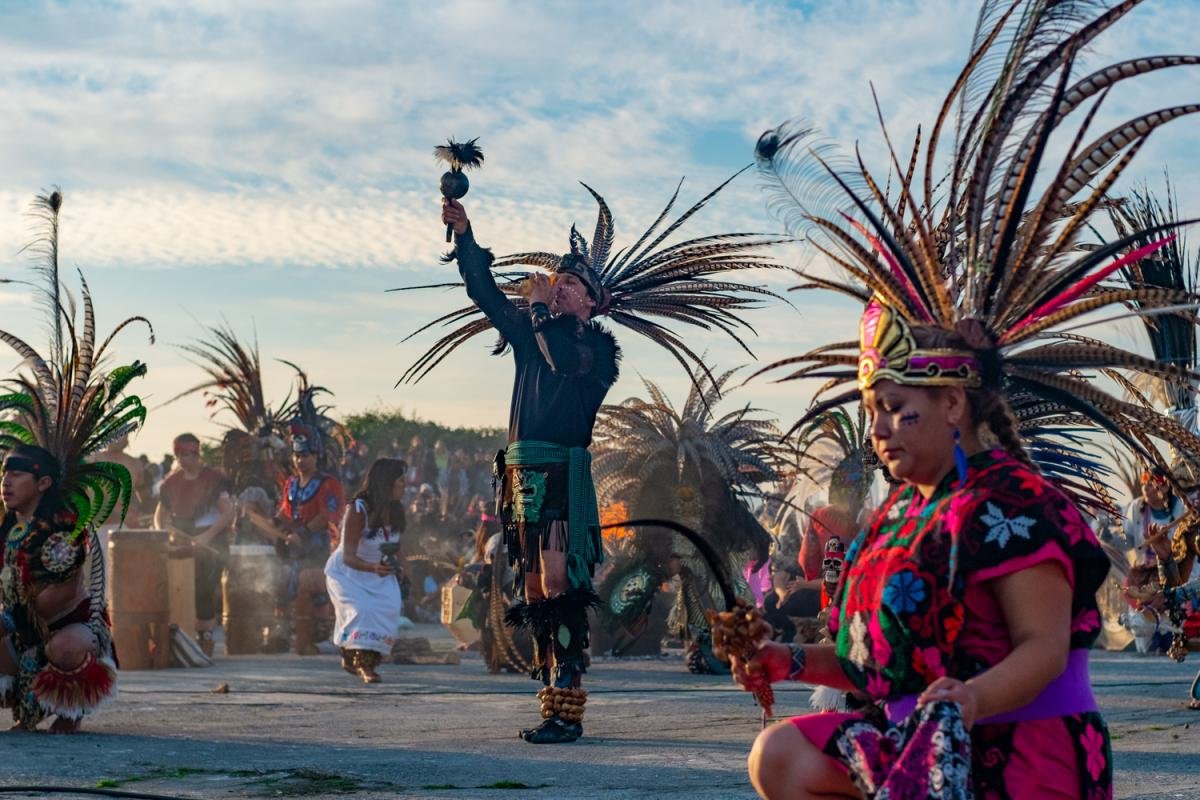Land Acknowledgment
Presented at the San Francisco Anti-Displacement Coalition Retreat 2024
Keane Chukwuneta & Priya Prabhakar
January 24, 2024
Keane Chukwuneta & Priya Prabhakar presenting at retreat
The following land acknowledgement was presented by Priya and Keane as their contribution to open the San Francisco Anti-Displacement Coalition (SFADC) annual retreat.
Hi everyone, welcome to the SFADC Retreat 2024! To begin our sessions today, we wanted to reflect upon feedback from last year’s retreat, and one of those pieces of feedback was the importance of grounding our work and reflection today in acknowledgement of the history of the land that we live and organize on. Instead of just reading out a land acknowledgement, Keane and I wanted to go a little deeper into the history of this land, Indigenous cosmologies of the relationship of land and people, the importance of making connections of global solidarity in the Indigenous struggle for land back, and our role in this as a coalition.
Our communities are under a consistent and sustained assault from corporate and real estate interests enabled by local and state governments, and our communities at ADC collectively work towards resisting that. In order to do this, however, we must understand that the land and its people remember that this assault is a continuation of the social and economic dominance that this nation-state was built upon, which manifests in the historical and present-day structure of settler-colonialism – a structure of the elimination and genocide of Indigenous peoples through land theft and loss of culture and language by European settlers.
Prior to the violence of settler-colonial expansion, the land that we are on today was and is known as “Yelamu”, and this land was and is stewarded by the original Ramatyush Ohlone people of the San Francisco peninsula. One of the things that settler-colonialism did was fundamentally negate Indigenous cosmologies, specifically the human relationship to land.
The Ramaytush Ohlone: Original Peoples of the San Francisco Peninsula:
I wanted to read out an excerpt from the book Braiding Sweetgrass by Robin Wall Kimmerer. Kimmerer is a scientist and member of the Citizen Potawatomi Nation in what we know as “Oklahoma”:
"Children, language, lands: almost everything was stripped away, stolen when you weren't looking because you were trying to stay alive. In the face of such loss, one thing our people could not surrender was the meaning of land. In the settler mind, land was property, real estate, capital, or natural resources. But to our people, it was everything: identity, the connection to our ancestors, the home of our nonhuman kin-folk, our pharmacy, our library, the source of all that sustained us. Our lands were where our responsibility to the world was enacted, sacred ground. It belonged to itself, it was a gift, not a commodity, so it could never be bought or sold. These were the meanings people took with them when they were forced from their ancient homeland to new places. Whether it was their homeland or the new land forced upon them, land held in common gave people strength; it gave them something to fight for.”
For me, personally, as someone who is not Indigenous, learning about Indigenous cosmologies was paradigm shifting. Even though I’ve been aware of the fact that this is stolen land and even though I’ve been involved in housing justice, to really deepen my understanding of that, I had to see land not as an object, but as a subject – a living, breathing being, like you and I. Something that really solidified that understanding for me was attending the Sunrise Ceremony on Thanksgiving day and making the fundamental connections of the Indigenous struggle for freedom here to the Indigenous struggle for liberation in occupied Palestine.
Today is the 112th day of the genocide in Gaza, perpetrated by the Israeli state and funded by Western powers, including the tax dollars that we pay here in the United States. The settler-colonial ideology of Zionism has seized the lives of more than 26,000 Palestinians, it has desecrated the sacred land – seeking to sever the relationship between the Indigenous people and their land, much like what was done here to the Ramatyush Ohlone. This is the continuation and escalation of an over-100-year occupation of Palestine, first by the British, and now by Israel. Palestinian poet Mahmoud Darwish once said, “We have on this land that which makes life worth living.”
What makes our movements stronger is acknowledging that we all have been coerced to participate in and have helped build an economy that has been constructed on top of and without the consent of, native Ramaytush Ohlone people. We all have been coerced to fund the massacre of the Palestinian people and other peoples of the Global South who have been assaulted by U.S. imperialism. Our taxes are going to feed the war machine instead of safe and affordable homes, strong communities, and tending to the land. Making these connections and acknowledgements can help us build our networks and solidarities of resistance.
The history and present of San Francisco is one in which working class people have been invited to, discriminated against, and displaced according to the whims of the elite. Many of whom were building wealth in colonial ventures in South and Central America, the Caribbean, and the Pacific. This history is of a piece with that of the history of the California Genocide, in which Ramaytush Ohlonhe peoples were first used as a labor force in the California Mission*, before being dispossessed, ethnically and culturally cleansed, and finally displaced. This continues to this day, where immigrant and working class communities are invited to San Francisco, discriminated against, pressured to conform and displaced seemingly at will.
These tools are modern variants of the tools of Empire. They were first developed in conflicts with native inhabitants “abroad” before they were then implemented as tools of control on working class people. So while many of us may not be the native inhabitants or stewards of this land, because of our position within the settler economy, the same theories that were developed to exploit and dispossess native Ohlone are seen here. The same tools that are used to control Palestinians, from the spyware pegasus, to the kettling techniques used by local police to control local protesters, are exported and used here and around the world.
In order to resist these forces, we must contextualize our fights with these corporate interests in terms of the land. Who controls it? And to what end? The answers to these two questions form the basis of why we take the battles we do as the SFADC. Will future development of housing and policy in SF destroy the remaining non market rate housing in the city? Further entrenching the control of the private market which demands scarcity and criminalization of homelessness to extract profit? Or will it meet the needs of the people of San Francisco? And enable people of all sorts to participate in the future development of the city. Every campaign we embark on or tool we create, from the housing element, to the budget, to the organizing trainings we run, to tenant protections 3.0 collectively will determine that future.
We must continue to organize and develop ties between our members to build the kind of movement that is capable of challenging the ideological grandchildren of European Christian colonialists. By that I mean capitalists, real estate developers, wall street, the tech elite, and their politicians who are currently engaged in a campaign to remake San Francisco into a conformist dystopia for themselves, that will violently exclude from it anyone they deem undesirable and continue to invest their immoral profits in war and weaponry instead of the development and liberation of working people here and abroad. I speak so strongly because I come to this as a second generation Nigerian-American. This doesn’t make me an expert or an authority on this stuff but I certainly have a different set of experiences than most. A family that is currently sprayed across the globe. Many members of which have died in or were traumatized by the decades of political violence that have wreaked havoc on my family, or in the violence of dispossession and underdevelopment.
So I come to this speaking with a laser focus on what I perceive to be the central force driving the conditions that have forced us to organize. Colonialism. That we must take on the forms of discrimination and marginalization used to divide us. Like Antisemitism, islamophobia, racism, misogyny, homophobia, transphobia and more.
I feel proud to be living in the Bay Area as hard as it is, because our peoples and our movements, for centuries, have resisted, engaged in civil and uncivil disobedience, opposing settler-colonialism and domination both here and abroad.
And to conclude:
File Photo: From “UnThanksgiving Ceremony On Alcatraz” 2014; Photo by Joseph Smooke.
“The SFADC acknowledges that we occupy the ancestral homeland of the Ramaytush Ohlone peoples, who are the original inhabitants of the San Francisco Peninsula. We recognize that the Ramaytush Ohlone understand the interconnectedness of all things and have maintained harmony with nature for millennia. We honor the Ramaytush Ohlone for their enduring commitment to mother earth. As the indigenous protector of this land and in accordance with their traditions, the Ramaytush Ohlone have never ceded, lost, nor forgotten their responsibilities as the caretakers of this palace, as well as for all people who reside in their traditional territory. We recognize that we benefit from living and working on their traditional homeland. As uninvited guests, we affirm their sovereign rights as first peoples and wish to pay our respects to the Ancestors, Elders and relatives of the Ramaytush community. We recognize that to respectfully honor Ramaytush peoples we must embrace and collaborate meaningfully to record indigenous knowledge in how we care for San Francisco and all its people.”
We want to pay tribute to and thank the American Indian Cultural District and the San Francisco Public Library Commission for this formal land acknowledgement.


